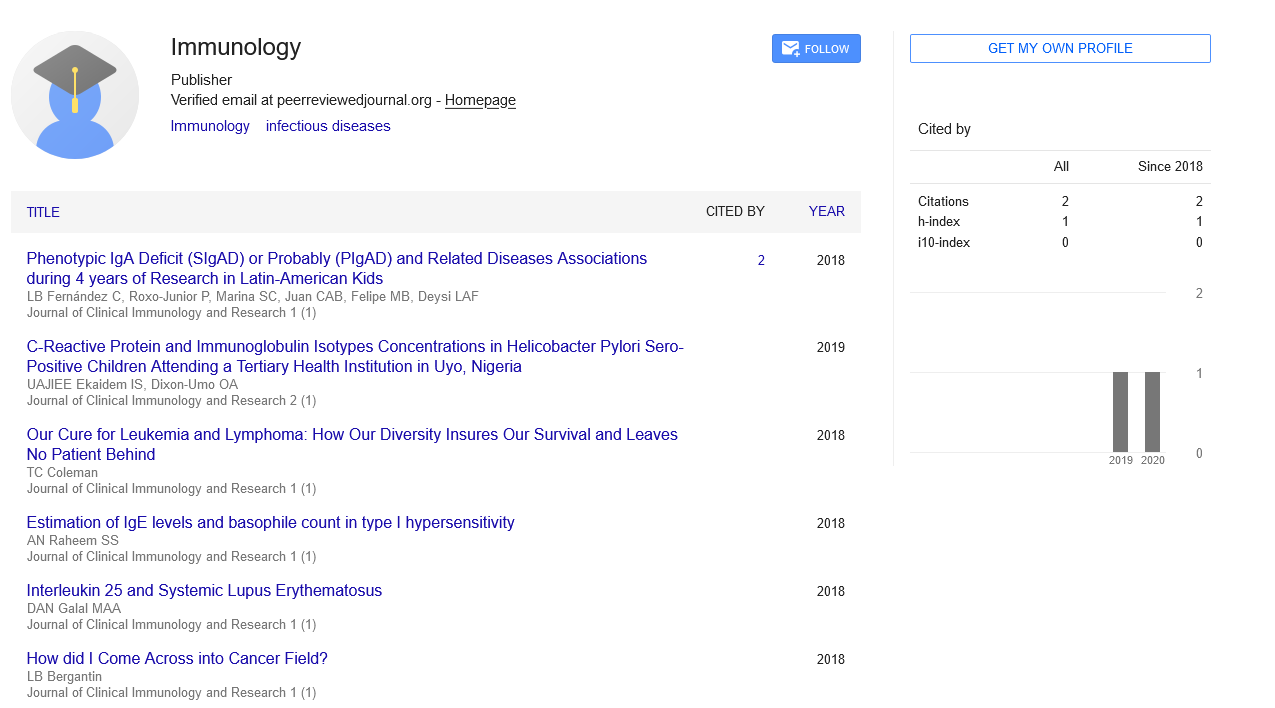Opinion Article, J Clin Immunol Res Vol: 6 Issue: 2
The Vital Role of Helper T Cells in Immune Defense
Wenchao Len*
1Department of Clinical Pharmacology, Central South University, Changsha, China
*Corresponding Author: Wenchao Len,
Department of Clinical Pharmacology,
Central South University, Changsha, China
E-mail: lenwenchao@gmail.com
Received date: 15 May, 2023, Manuscript No. JCIR-23-104728;
Editor assigned date: 17 May, 2023, PreQC No JCIR-23-104728 (PQ);
Reviewed date: 01 June, 2023, QC No JCIR-23-104728;
Revised date: 08 June, 2023, Manuscript No JCIR-23-104728 (R);
Published date: 16 June, 2023, DOI: 10.4172/JCIR.100084
Citation: Len W (2023) The Vital Role of Helper T Cells in Immune Defense. J Clin Immunol Res 6:2.
Abstract
Description
The immune system serves as the body's primary defense against pathogens, and its effectiveness relies on the intricate collaboration of various immune cells. Among these, Helper T cells (Th cells) play a important role in orchestrating immune responses. Acting as conductors of the immune system, Th cells coordinate and regulate the activities of other immune cells, ensuring an appropriate and effective immune defense.
Helper T cell overview
Helper T cells, a subset of lymphocytes, are an integral component of the adaptive immune system. They are primarily characterized by the presence of the cell surface protein CD4. Upon encountering an antigen, helper T cells become activated and initiate a cascade of immune responses. Helper T cells can differentiate into different subsets, including Th1, Th2, Th17, and T follicular helper (Tfh) cells, each specialized in supporting distinct immune functions.
Immunological signaling: Helper T cells excel in their ability to recognize and respond to antigens presented by Antigen-Presenting Cells (APCs) such as dendritic cells. The interaction between APCs and helper T cells occurs through the presentation of antigens on Major Histocompatibility Complex Class II (MHC-II) molecules, which bind to the T Cell Receptor (TCR) on helper T cells. This engagement triggers a complex signaling cascade, leading to helper T cell activation.
Th1 and Th2 responses: Th1 cells are primarily involved in cellular immune responses against intracellular pathogens, such as viruses and certain bacteria. They secrete cytokines such as interferongamma (IFN-γ) that stimulate the activity of cytotoxic T cells and promote phagocytosis by macrophages, enhancing the elimination of infected cells.
In contrast, Th2 cells are important for humoral immune responses, particularly against extracellular pathogens such as parasites. They promote the production of antibodies by B cells and enhance the activity of eosinophils and mast cells, contributing to the clearance of pathogens.
Th17 Cells and Tfh Cells Th17 cells are involved in inflammatory responses, particularly at mucosal sites, and play a role in defending against fungal and bacterial infections. They produce cytokines, including Interleukin-17 (IL-17), which recruit neutrophils to the site of infection, promoting an inflammatory environment that aids in pathogen clearance.
Tfh cells are essential for supporting B cell responses within lymph nodes and facilitating the formation of germinal centers. By providing important signals, Tfh cells help B cells undergo affinity maturation, class-switching, and the generation of long-lived plasma cells and memory B cells.
Regulatory T cells: Within the helper T cell subset, regulatory T cells (Tregs) play a unique role in maintaining immune tolerance and preventing excessive immune responses. Tregs suppress the activity of other immune cells, including other T cells, B cells, and antigenpresenting cells. Their function is important in preventing autoimmune diseases and maintaining immune homeostasis.
Conclusion
Helper T cells are indispensable for the orchestration of immune responses. Through their various subsets, including Th1, Th2, Th17, Tfh, and Tregs, they fine-tune immune reactions, ensuring an appropriate response to invading pathogens while preventing excessive inflammation and autoimmune reactions. The intricate interplay between helper T cells and other immune cells is important for maintaining immune homeostasis and mounting effective immune defenses.
 Spanish
Spanish  Chinese
Chinese  Russian
Russian  German
German  French
French  Japanese
Japanese  Portuguese
Portuguese  Hindi
Hindi 